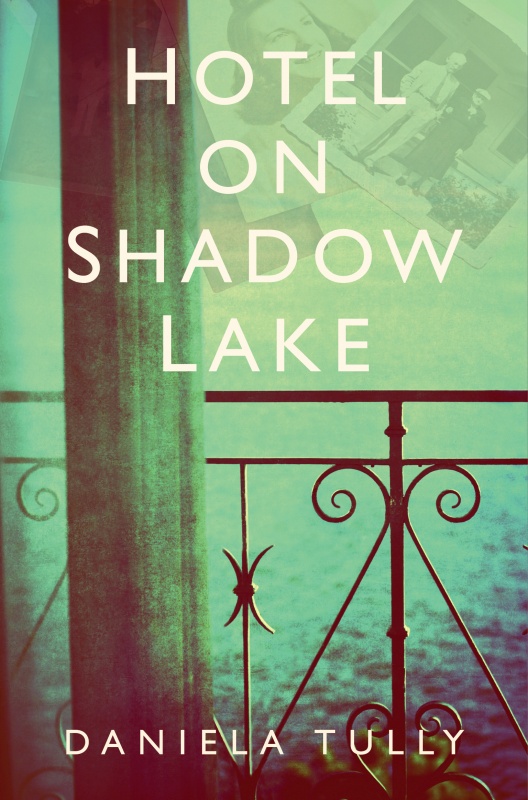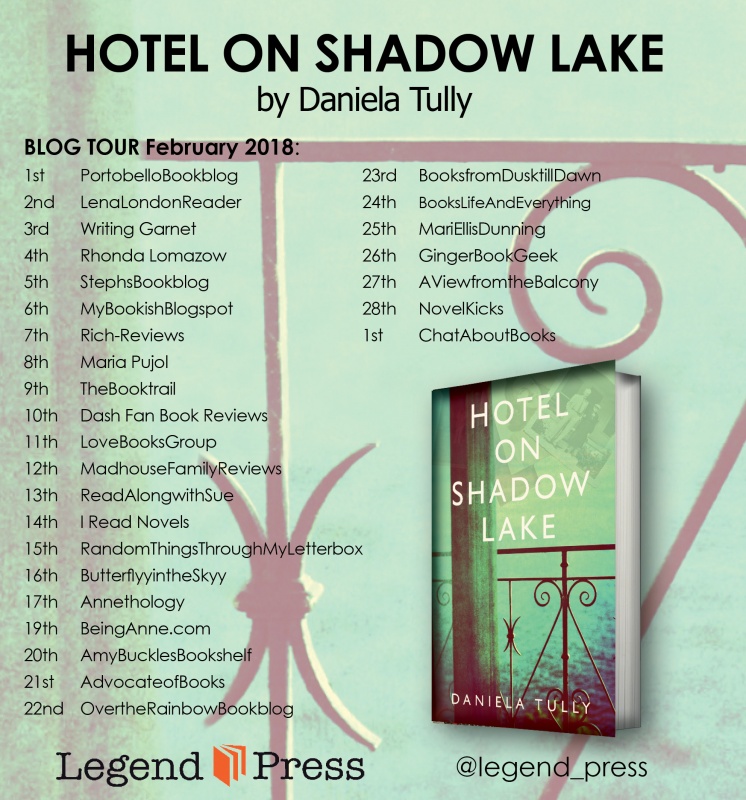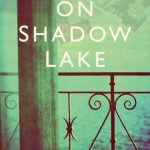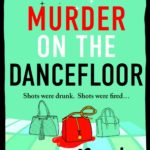NK Chats To… Daniela Tully
 Daniela Tully’s debut novel, Hotel on Shadow Lake was released by Legend Press on 1st February. It’s lovely to welcome you and the blog tour to Novel Kicks today, Daniela. What’s your book about and what inspired the story?
Daniela Tully’s debut novel, Hotel on Shadow Lake was released by Legend Press on 1st February. It’s lovely to welcome you and the blog tour to Novel Kicks today, Daniela. What’s your book about and what inspired the story?
Thank you for having me! Let me start with what inspired the story: my grandmother had a twin brother, a German fighter plane pilot, who died during WWII. As he felt his death nearing, he wrote a farewell letter to my grandmother and their mother, at the end of 1944. That letter, however, was held up in the East, when the Berlin Wall was erected, and only reached my grandmother in 1990, after the Wall had come down. The letter in my novel contains much more than a “simple” good bye (the reader doesn’t learn the content until the end). In my novel, the recipient disappears without a trace after receiving the letter. Twenty-seven years later, a landslide in upstate New York uncovers her remains. Her granddaughter back in Germany thought she had come to terms with the disappearance of her grandmother, who was her surrogate mother, her best friend, and a storyteller of spellbinding, mystical fairy tales. But when her grandmother’s body is found in a country her grandmother had no connections with, the granddaughter begins to question everything. Who was this woman? What made her leave Germany? What were her ties to the captivating yet chilling Montgomery Hotel, located near the site of her death? As Maya seeks answers in the States, she finds herself sidetracked by her own assumed identity—and how much it enchants the charming heir of the Montgomery dynasty. She soon discovers that the best way to the truth about her grandmother might be through surrendering herself to the majestic Montgomery Hotel, the strange family that owns it, and the spirits that live on in the dark surrounding wilderness…
In the plot strand set in the past, the reader travels with Maya’s grandmother, Martha Wiesberg (Martha was also my grandmother’s Christian name) to a Germany on the cusp of World War II. And later in the novel we return there again, but for reasons that I cannot disclose here, as they are not only connected to the twist in my story, but also deliver some of the reasons why Martha Wiesberg disappeared in 1990 – and why she had to die. It also sheds light on a historical aspect of the Second World War that hasn’t received too much attention yet, but one I find a fascinating angle.
What’s your typical writing day like? Do you have any writing rituals?
I often made attempts to write from home, but they have never been as fruitful as those times when I leave the house to write. I write best on the move (road trips, planes, trains) and second best in a public setting like a coffee shop.
 What planning did you do prior to beginning the novel? Do you have any planning tips to share?
What planning did you do prior to beginning the novel? Do you have any planning tips to share?
I don’t know the entire plot before I start writing. With Hotel on Shadow Lake, I knew the first scene and the final one, but not every plot point in between. And my writing process got hung up on that at first. My husband, who is a screenwriter himself, suggested to me to just start writing those scenes I already had in my head, a wise piece of advice, because from then on the flow became natural; the characters, as clichéd as this might sound, did start talking to me at some point, telling me what to do.
Did you prefer to have a complete first draft before editing and how do you think is the best way to approach the editing process?
Yes, I do prefer to have a complete draft before digging into changes. As this is my debut novel, I was probably more protective of my words than other more seasoned writers, so at first I was always on the defensive, instead of embracing those changes that improved the pacing.
What elements do you believe make up a good novel?
In my mother language we have a saying that I often used during my tenure as a film producer, in the script development process: You need to pick up the viewers at the doorstep of their home, and then convince them to follow you out. The same goes for a good novel. The best novels create an immediate relevance, regardless of the location or the culture it is set in. Of course, relevance is subjective to a certain degree, but I am fascinated when writers skillfully manage to break through that reserve, against all obstacles, and win you over in the first few pages.
Do you think plot or character is more important?
I am generally a plot-driven person, and I love to create my own plot out of a story to then have the reader figure out the story of my plot. Of course, you also need good characters in a novel, but I feel the danger is that you can create the most interesting characters in the world, who then grow pale when trapped in a weak story.
What’s your favourite word and why?
I love the word ‘ocean’ — it can be used to create beautiful images. In fact, I loved it so much that I had way too many “oceans” in Hotel on Shadow Lake, and had to say goodbye to many of them.
Are you working on something new that you can tell us a bit about?
My next novel is partially set in Dubai, where I have been living now for several years.
 Which authors do you admire and why?
Which authors do you admire and why?
I adore Gabriel Garcia Marquez for having gifted the world of literature with magical realism; I admire Jojo Moyes and Kate Morton for their skill at interweaving different timelines and making each of them indispensable for the creation of the complete picture; Jennifer McMahon for her dark mind; Carlos Ruiz Zafon for the worlds he creates.
Which historical person would you like to meet and why?
I am torn between Alfred Hitchcock and Luis Buñuel. The first, to be able to tap into his mind and take it with me to the present; the latter for similar reasons, but also to travel with him to a Mexico that was so different from today’s (my thesis at university was on Mexican cinema, so I am passionate about this subject). Both of them were extraordinary filmmakers and exceptional storytellers.
Which fictional character would you like to swap places with for a day and why?
Pippi Longstocking. No question. I always adored her as a child: her humour, her impish actions. As an adult, I wish for her carefree life, if only for one day.
What are the challenges of writing historical fiction?
Surprisingly, I found it less challenging than creating the present-day plot strand. Some writers say the research, and I see their point… but researching is fun, especially since my knowledge about WWII had gotten a little rusty since high school (Stay away from the internet, though!). I was fascinated by everything that I either “relearned” or discovered for the first time. I spent five years in Munich, so I enjoyed transporting myself back to the Munich of 1938. My grandparents have never been too talkative about the war — they weren’t overly keen on revisiting those memories, I guess; but the more I dug into the past, the more fragments I remembered of what my grandmother had told me. Especially the emotional stories she shared with me.
What advice do you have for someone who is thinking of writing a novel or attempting to?
Writing is a lonely process. Some love it, others cannot embrace it. Find out about yourself, and what type you are. My literary agent gave me another piece of good advice when I told her I had time issues: write every day, even it it’s only for twenty minutes. Soon those twenty minutes turn into more, and a story gets created. I learned that writing is like a muscle you need to train to get stronger. And last but not least: don’t get hung up if you don’t know how your story ends. There’s the kind of writer who does know, and the kind who doesn’t. I belong to the latter group, and that gets me going. I guess that’s why I always despised exposés and treatments as a film producer. Outlining a story is like writing a manual for a kitchen appliance that will never work, in the end. To me it is, at least.
 More about Daniela:
More about Daniela:
Daniela was born in Germany, and has lived all over the world, including Mexico, New York and Dubai. As a film-maker she has been involved in projects such as the critically acclaimed Fair Game, box-office hits Contagion and The Best Exotic Marigold Hotel, as well as the Oscar-winning The Help.
Hotel On Shadow Lake is her first novel. It is available in most UK shops and online. Click to view at Amazon UK – https://www.amazon.co.uk
 My verdict on Hotel on Shadow Lake…
My verdict on Hotel on Shadow Lake…
To Maya, her Grandmother Martha was everything to her. She was her best friend, the teller of magical stories and a surrogate mother. When Martha disappears without a trace, Maya is heartbroken. Over two decades later, Martha’s remains are found. Maya is determined to find out what happened to her Grandmother and she travels to America to find answers.
I knew before I even began this book that I was going to like it. There was something very compelling about the plot of the novel. A letter from 1940’s that isn’t delivered until the 90’s because of a wall. Incredible.
It’s told from the point of view of both Maya and Martha and who is in Germany in the 1930’s as the Nazi regime is reaching momentum.
I had never really looked at this time in history from the point of view of someone like Martha. It was interesting to see how women were seen and how the Hitler youth was recruiting so many men who believed it to be part of a positive future for their country.
There are so many layers to this novel. There is the love story but there is also mystery, heartbreak and a puzzle to be solved. Some scenes literally had me sitting up, biting my nails and on edge wanting to know what happened next.
As Maya is trying to figure out what happened to her Grandmother, this helped pull me into a story that I couldn’t stop reading.
Maya is an interesting character. She embarks on quite an emotional journey at the start, not knowing what she is going to find.
I really enjoyed both character’s story arcs but Martha’s is the one I was particularly drawn to. I felt like I got a good idea of what 1930’s Germany was like. The stories intertwining helped build the tension within the novel.
This book is historical fiction, a love story and an insight into a turbulent era. Even if it’s not usually your kind of book, give it a go. I loved it.





Leave a Reply